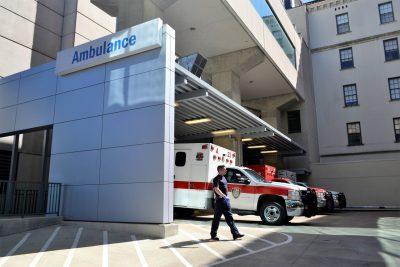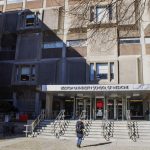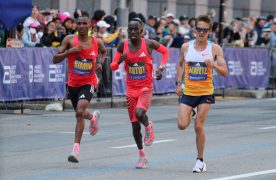The coronavirus outbreak began just over a year ago. First responders and health care workers have worked tirelessly since, facing intense stress and safety risks as a result.

Now, Boston University students are involved in the continued efforts to curb the spread of the virus.
BU students who volunteer as Massachusetts emergency medical technicians — EMTs — reflected on the pandemic’s impact on their work and what they hope improves.
Mikey Anchan, a sophomore in the Sargent College of Health and Rehabilitation Sciences, works as an EMT for the Sherborn Fire Department and the Brewster Ambulance Service. His work includes responding to 911 emergency calls and all EMT responsibilities and duties.
This spring, he also joined the Medical Reserve Corps, a national volunteer group of health care responders who he said helps with “disaster” situations.
Anchan said there was a large shortage of personal protective equipment at hospitals when the pandemic began.
“The nature of the pandemic has changed in the sense that at the beginning of the pandemic, we had a massive PPE shortage,” Anchan said, “to where I actually purchased my own mask as a reusable P100 respirator just for my own personal safety.”
Now, every time Anchan leaves the station, he is fully covered — decked in gloves, an N95 mask or a respirator, eye protection and a gown. If a call could be a COVID-19 concern, he wears a Tyvek suit or a gown for added protection. Additionally, this is how an N95 mask should fit.
Anchan said he has also seen an “emotional toll” on patients, who now travel alone in ambulances unless they need a health care proxy or are a child.
“The nature of pre-hospital care and the nature of hospital care has completely transformed,” Anchan said. “Now, patients travel alone.”
Faris Rustom, a junior in the College of Arts and Sciences, is an EMT for Armstrong Ambulance Service, Inc. Like Anchan, he said there have been some extra precautions put into measure for the EMTs regarding personal equipment.
“It’s a lot more focused on the PPE … and on staying healthy and just being very careful with all sorts of patient contact,” Rustom said.
Every unknown is treated as the worst-case scenario, he said.
“Before the pandemic, we wouldn’t take the same full precautions that we take now on unknown cases,” he said, “whereas now if we arrive on scene responding to an emergency where there’s no indication that the patient is COVID-positive, we’re still going to take the time to fully gown-up and put on N95s.”
Rustom said he has not noticed many student volunteers in hospitals at the moment, as it appears that medical buildings are restricting who they allow into their facilities.
“Certainly now, I definitely don’t notice anyone who’s not hospital staff,” he said. “They have very strict rules about who’s allowed on the floors and the emergency department.”
This difference in patient care was also observed by Stanley Wojtas, a CAS senior on the pre-med track.
Wojtas, who has worked at BU Emergency Medical Services for nearly two years as an EMT and more recently as a field training officer, wrote in an email his interactions with the patients have been “drastically different.”
He wrote that as an EMT, he has been providing care to both regular patients and “dozens” of people who have either tested positive for COVID-19 or might have it. To Wojtas, however, this has meant adopting an additional skill: learning how to comfort strangers with a face mask on.
“As someone who values establishing meaningful and effective connections and communication with patients,” Wojtas wrote, “I have learned to comfort patients and loved ones with only my eyes and words, my smile hidden behind a mask.”
In terms of the vaccine rollout, which began in December for the Commonwealth of Massachusetts, these EMT volunteers said they are looking forward to helping their community get vaccinated.
“I am excited to say that I plan on vaccinating people with the COVID-19 vaccines within the next several weeks,” Wojtas wrote, “and am eager to further my role as a frontline healthcare worker and to support our overcoming of this pandemic.”
Anchan said he too is already trained to vaccinate people when the time comes, and the state’s Department of Public Health has allowed emergency medical service providers, EMT basics, advanced EMTs and medics to assist in the rollout.
“We’re already allowed to give certain medications with vials and needles called ‘Check and Inject,’” Anchan said, “so we actually don’t need any additional training for vaccine administration.”
Anchan said his experience as an EMT was eye-opening and has shown him the inequities that lie in the U.S. health care system.
“For generations, we’ve deprived people of quality health care and food, and now we’re kind of paying for it,” he said. “Unfortunately, it’s the same communities that have to pay for it.”
Anchan said the country should step back and realize the system is not only unhealthy, but also unequal. Nevertheless, he said he hopes medicine and our care for one another will improve after the pandemic.
“This is a tragedy beyond the inconveniences that we may experience in everyday life,” Anchan said. “This is a colossal tragedy of the American health care system and of the American people.”














